Fostering Food Neutrality from Baby's First Bites with @raisingbodypositivekids Riley Peterson, RD
- Food Neutrality: what it is and how we can make a food neutral household
- Language: words to use and not use when describing food for your baby
- Body image: how our words can impact our children's perceptions of themselves
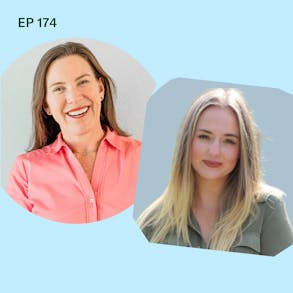
LISTEN TO THIS EPISODE
Episode Description
Do you ever catch yourself saying negative things about food at mealtime even when you don’t realize you’re doing it? Our babies and kids are watching and listening and our words are shaping their relationship with food even from their first bites. In this episode I’m interviewing dietitian and body positive coach Riley Peterson from @raisingbodypositive kids about how we can create a more food neutral household.
Using this positive language and avoiding certain words about food can go a long way in helping to avoid the charged associations with foods that many children are exposed to very early in life. You CAN create a food neutral household in YOUR house and it can start as early as when your baby is beginning solid foods with baby-led weaning.
About the Guest
- Riley Peterson is a Registered Dietitian and Body Positivity coach
- She helps parents navigate challenging food environments with their kids to help prevent negative associations with food and body image
- Riley specializes in helping families create Food Neutral Households and reshape their language about food and body
Links from this Episode
- Follow Riley on Instagram @bodypositivekids
- Baby-Led Weaning with Katie Ferraro program with the 100 First Foods™ Daily Meal Plan, join here: https://babyledweaning.co/program
- Baby-Led Weaning for Beginners free online workshop with 100 First Foods™ list to all attendees, register here: https://babyledweaning.co/baby-led-weaning-for-beginners

Latest Episodes
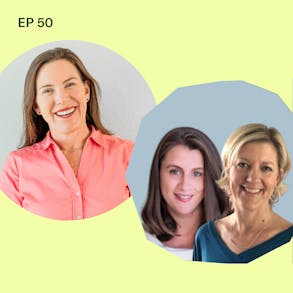
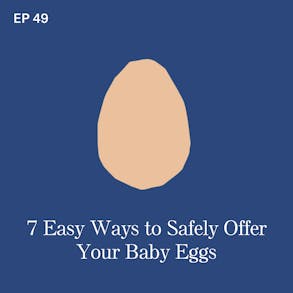

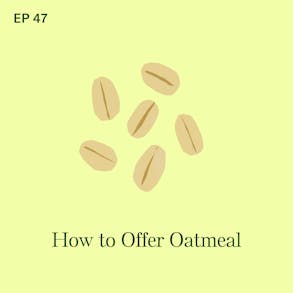
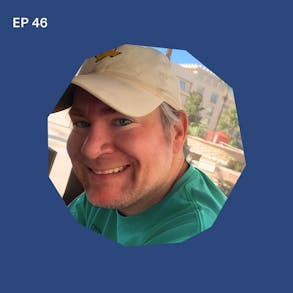
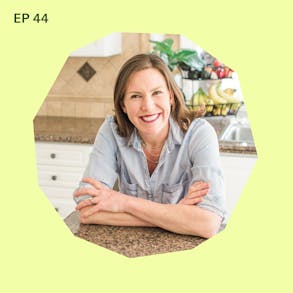
Riley Peterson (1s):
These are charged associations. We often assign to food. Unintentionally. These words can lead to food, fixation, anxiety, feelings of guilt and shame, but we can reshape our language to be more food neutral, even from your baby's first Bites.
Katie Ferraro (15s):
Hey there I'm Katie Ferraro Registered Dietitian college nutrition professor and mom of seven specializing in baby led weaning here on the baby led weaning made easy podcast. I help you strip out all of the noise and nonsense about feeding, leading you with the competence and knowledge you need to give your baby a safe start to solid foods using baby led weaning. Tell me the truth. Do you ever catch yourself at mealtimes with your baby using negative language and you don't even realize that you're doing it? I'm raising my hand because I do this all the time and it's really been a struggle for me.
Katie Ferraro (56s):
I have to practice using positive language when I want to yell, like stop. No, don't do that. Don't throw it on the floor. And so today I brought on someone who specializes in this, okay, there's this concept called Food neutrality and it's how to create a Food neutral household so that you're not using language that sets the stage in your baby's head, that there's this idea about good foods or bad foods, or they start to have charged or negative associations around food. Because if you're like most typical adults, you don't always have the best relationship with food yourself. And I know for those of us who can say that about themselves or selves, that we don't want to recreate those issues in our babies. So today's guest is Riley Peterson. She is a Registered Dietitian and a body positivity coach.
Katie Ferraro (1m 39s):
She is going to be teaching us about Fostering Food Neutrality. And I think this is such an interesting concept. Riley is on Instagram at raising body positive kids. She does a lot of really entertaining reels. Like I laugh out loud at them cause it's like, she's kind of making fun of parents and the stuff we accidentally do in the negative language that we say that is starting to set the seeds or sow the seeds of negative food associations for our baby. And it's tied to body image and like all this scary stuff that happens when your kids get older. So Riley is here to help parents navigate the confusing food environments that we are raising babies and children. And so with no further ado, I want to introduce you guys to Riley Peterson. This is Fostering Food Neutrality from Babies.
Katie Ferraro (2m 20s):
First Bites with Riley, who is a registered dietiitian and a body positivity coach.
Riley Peterson (2m 28s):
Thanks so much for having me Katie, It's great to be here.
Katie Ferraro (2m 31s):
Well, I am so excited about this interview because every week, you know, I interview credentialed professionals in food and feeding like yourself, but they're always teaching and talking at the Baby level, like what should the baby be doing? Or how should the baby be responding? But your work as a registered dietitian and a body positive coach, it's so important because you are helping the parents and helping them navigate the very stressful feeding environment that we're all operating in today. So tell me a little bit about what you do as a Registered Dietitian and a body positivity
Riley Peterson (3m 0s):
Coach. Ultimately, I understand that there are a ton of challenges that make it really difficult for kids to develop these healthy relationships with food as they grow up. Right? So we've got diet culture and social media. We've got these crazy unrealistic beauty standards and expectations. I felt it in myself growing up and to be quite honest, I don't really know too many people who didn't feel those challenges. So, you know, friends, family members, strangers, my audience, they're all telling me the exact same thing, right? It's that building healthy relationships with food and body image is really, really hard. And so that's kind of where I come in. I know that there's this trickle down effect where these feelings and frustrations around food, these things that we've been feeling as adult for a really, really long time they're noticed and adopted by kids.
Riley Peterson (3m 50s):
So I'm seeing research. That's suggesting that, you know, more than half of young girls growing up and a third of young boys are feeling unhappy with the way their bodies look and they're starting to attempt dieting behaviors and, you know, with the intention of losing weight really, really young. And so if we look at these trends, they're really concerning. And so my thought is with my expertise, there's something that I can do to kind of change up this pattern. My job as a dietitian is to work with parents, to help them understand the strategies and contexts. They need to start changing some of these patterns. So I helping reshape the way that we think and act and talk around food.
Riley Peterson (4m 30s):
We can create new normals for future generations to come. So we have this ability to raise up generations of healthy body positive kids, and I've identified some of those key strategies that parents can use to strengthen their kids' relationships with food and heal their own damaged relationships with food along the way. So that's kind of my role as a dietician and a body positivity code.
Katie Ferraro (4m 52s):
And I love that because I feel like so often we just feel helpless. Like how can I compete against social media and bullying and diet culture and unrealistic norms of what body weight is supposed to be. But you're saying we really can with positive messaging in parenting. And what I want to talk about at possible is I know every time I talk to a parenting expert like yourself, who specializes in an area that I know nothing about like body positivity, coaching as a parent, I kind of just want to cut to the chase. And so I want my audience. I think they feel the same way and say like, what am I doing wrong? What am I saying wrong? Like, what are the words that I might be using right now that are maybe gonna mess my kid up down the road? And I don't even realize it now. Just curious for your take, what are the things that we should avoid saying even to children, as young as our babies and our children, as they are learning how to eat and navigate these confusing and challenging food environments in situations like talk about the language please, and what not to say.
Riley Peterson (5m 44s):
Of course We know that kids hear everything, you know, even when we don't mean them to. So first and foremost, I recommend that parents avoid making any negative or disparaging comments about themselves, especially related to size. And so you're valid when you have those negative thoughts about yourself, about your appearance. They're very normal thoughts to have, and they're often unavoidable. But ultimately the key point is that we don't want our kids to hear that. Imagine if we heard our kids say something bad about themselves, right, then you'd be devastated. So I understand that as adults, we have a little bit of a different perspective. Sometimes we eat a little healthier. Sometimes we were still able to fit into a pair of old pants, but it's really important that we avoid making these negative kind of comments about ourselves.
Riley Peterson (6m 29s):
We avoid talking about dieting. We avoid talking about weight loss. We do not want to teach our kids to diet and attempt weight loss. And these types of behaviors can really lead to more negative consequences as they get older. You know, those disordered eating behaviors that can escalate pretty significantly. So we want to prevent them from learning those behaviors and keeping our comments to ourselves can be a really effective way from helping teach them those types of thought patterns. And it's also really important to avoid those comments about other people in front of your children. You know, these comments can slip out, you know, you don't like that. Person's outfit some, person's got a unique hair cut and you make a small little comment about it, but just like we want to avoid exposing kids to those negative self-talk patterns.
Riley Peterson (7m 15s):
We talk diet talk. We also want to avoid them kind of avoid exposing them from talking negatively about others. So research shows that kids as young as five years old are beginning to demonstrate biases towards others based on size and appearance. And so we have a responsibility to do what we can to prevent these biases from forming. And we can do that by keeping negative comments about others, to ourselves and not allowing kids to learn that behavior from us.
Katie Ferraro (7m 41s):
I love that. So basically we need to avoid saying negative things about ourselves and then saying negative things about other people. And you mentioned the dress, like I was talking to a friend the other day and she's like, you don't even realize it. But like she said, she was watching an awards show and there was someone like walking on the catwalk or whatever, and addressing the mom was like, what is the deal with her dress? And then she like heard her girl say it about someone else's dress the next day. And it's like, I love your recommendation. Like, just keep your comments to yourself. Like we tell our kids to do that. And then we sometimes forget to do it ourselves. So that's a great tip. I want to talk next about food Neutrality. I think it's such an interesting phrase, comment concept. And it's a concept that I'm hearing more about mostly from you. I love following you on social media. You guys, if you're not already following Riley, she's on Instagram @raisingbodypositivekids, her reels are so good.
Katie Ferraro (8m 26s):
Like you're so inspiring. You're so funny. I like find myself laughing out loud at them cause I'm like, oh my God, I totally do that. So you like a really natural way of teaching parents, what not to do, which is hard to do without being judging in the parenting space. And I just want to commend you on that because you've really hit the nail on the head and doing it in social media, which is where parents are, I think is really smart. Can you talk about food Neutrality and teach me and my audience? Like, what is it and how do we do it? I'm confused by it. But I want to learn more.
Riley Peterson (8m 51s):
It's kind of a new practice. And I feel like it's new for a lot of people, right? Ultimately I'll break it down. Really simply food Neutrality is just the practice of removing the labels from food that we eat. So you think of like good, bad junk food, super food, et cetera, things like that, dude, I hate
Katie Ferraro (9m 7s):
Superfoods. So I'm glad you're telling me it's okay to get rid of them
Riley Peterson (9m 10s):
So we can get rid of those labels. Ultimately, our goal is to create Neutrality, an even playing field between all foods. And I recommend this strategy because I want to avoid teaching kids. These charged associations that we often assigned to food unintentionally, these associations can result in things like emotional, eating food, fixation, food, aversion, guilt, shame around certain foods, things like that. So let me kind of give you an example of how this works in context. Many of us love dessert, right? Dessert's delicious. It's sweet. It's a favorite food. We've got to have it yet. We also label it as like junk food or it's bad for us. So when you pair these two things together, they lead to feelings of guilt and shame. We eat too much of it, or we have it too frequently.
Riley Peterson (9m 53s):
Instead of what we could do is we could create more neutral associations with dessert by, you know, saying something like, Hey, here's your dessert. We're going to have a little bit of it because too much of it can make our stomach cert. So teaching them the same thing, right where we're teaching them the concept of why we don't have dessert all the time, but we can tweak that language a little bit. And as parents, we can give kids a more neutral environment for eating and it provides them the opportunity to build healthy relationships with food while preventing these kind of negative charges, associations around certain food groups and certain types of foods.
Katie Ferraro (10m 29s):
And Riley. I love that you as a dietiian and a body positivity coach are not only teaching, okay, what words to avoid, but then what words do we say? Because it's like one thing to tell people what not to do. Like you could be a baby led weaning specialist who says, don't do all this stuff like that. Doesn't help you need to teach people what they can do. And so I like that you're teaching us like the positive words that we can add in, or at least even neutral, like to stay away from putting foods into different categories. And I know as a dietitian, like there's a lot of limitations in traditional Registered Dietitian training. You and I both know that you are actually my dietetic intern. I even worked with you before you were in college when you were a high school intern, like, and we've kind of spent years together at this point. And we have had discussions about the way dietitians are trained.
Katie Ferraro (11m 10s):
And I'm part of the problem. I am a didactic program educator. I previously taught nutrition at UC Berkeley. I teach in the nutrition program at San Diego State. And I look at the curriculum that we're teaching students and it's not always reflective of what's happening in the real world. Like we still have to teach in food preparation class, like how to make an egg foam Like, is that really important for helping parents navigate like the confusing food environment out there? So I just love this area that you're going into. I think it's so important for registered dietitians to be in there. And I love that you're helping the parents because it's like we didn't get any formal training in being parents. And yet all of these issues crop up. And I love that. You said like half of girls and a third of boys are starting to exhibit problematic behaviors and relationships with food from a very young age.
Katie Ferraro (11m 52s):
It's not just girls, it's all of our kids. And a lot of it stems from parents having an unhealthy relationship with food. So what I love about baby led weaning is it kind of gives parents, you get to start over, right? You're working with a blank slate. Your child doesn't have these crazy messed up relationships and food issues going on yet. And I'm a firm believer and the research bears it out that by offering Babies, a wide variety of foods and flavors and tastes and textures early and often they can become independent eaters and we can help prevent picky eating. You can't totally prevent it, but we can expose kids to more foods. They certainly can eat so many more foods than we give them credit for. And I think a lot of parents are, is eyeopening for them like, oh my gosh, I can make these foods. Or I don't have to talk about calories. And you know, parents, you know, Dietitian parents, like I had one like trying to measure the milligrams of iron in the food or baby was actually eating.
Katie Ferraro (12m 37s):
And I was like, you gotta chill. Like your baby needs to learn how to eat. And you're like putting so much pressure and stress on this situation because of nutrition. And you make a good point. We choose foods for lots of different reasons. Nutrition is just one of them. And I find myself, my kids, I don't even know how they, they learn about good and bad foods. And we try to have discussions about how all foods can fit, which, you know, you don't want them eating regular Cheetos and drinking regular Coke all the time. But sometimes those foods do come into your life and how do you deal with them? So thank you for the teaching that you do for parents. And I know you have some courses, you have some books. So what can my listeners who are mostly parents and caregivers and they're responsible for feeding babies? What can they do to start practicing food Neutrality today?
Riley Peterson (13m 17s):
Well, there are many strategies that parents can use to implement food Neutrality at home. The first thing that you can do to get started is to begin to reframe your ideas about health and nutrition. So kind of like you were saying, like all foods can fit into a healthy diet. And I think sometimes that ideas a little bit lost on people. Health goes so far beyond just the food we put into our bodies, you know, our physical health. We also have to consider our emotional or social and our mental health, all of which are impacted by our food choices. And so you are the best example for your kids continue to offer them a variety of food. And I know you guys are already really good at this. If you're following Katie's hundred first food methods, and I want to encourage that you begin to accept that healthy relationships with food and self image is more about finding balance than it is about eating a perfectly wholesome and clean diet.
Riley Peterson (14m 8s):
And you can start this practice today by being mindful about those labels that you use to describe food. So the good, the bad, the healthy and unhealthy doesn't mean that they don't have their good and bad qualities. It doesn't mean that some foods are better to eat a lot of, and there are other foods to keep in moderation, but just to know, slowly start to remove the language we use when presenting food to kids. This is the most straightforward way to practice food Neutrality. And you can literally start practicing this strategy today.
Katie Ferraro (14m 36s):
Riley, thank you so much. This is so valuable. I'm like taking notes left and right. Like I just love, I'm not good at positive language. I kind of, I specialize in negative language and screaming. I feel like as a parent, but I just love like getting the tips from you of like what exactly to say. And I have to practice it because sometimes these words don't come naturally. So if you feel awkward, like who cares if you're awkward in front of your baby, like they don't know any better, but practice this positive language. And where can our audience go to learn more about you and your work and to support the work that you're doing in your business?
Riley Peterson (15m 4s):
Yes. I know we talked a lot about food Neutrality today and we were only barely able to scratch the surface. Right? I developed a digital guide called creating a food neutral household for parents who want to learn more about the specific strategies that they can use to implement the practice of food Neutrality and help build healthy relationships with food at home.
Katie Ferraro (15m 25s):
And you guys, I feel like right when the guy came out, I got download. I was like the first person to download it. I'm such a fan girl. Sorry. I'm going to link to that guide on the show notes page for this episode. So if you guys go to BLWpodcast.com type in Riley Peterson or body positivity, it'll take you right there to the page. You can download the guide for free and learn more about creating a food neutral household. We'll Riley, thank you so much for coming on. This was hugely informative. I hope everyone walks away with a little bit more idea on the language that we can use and some steps to helping to create a food neutral household, even from our babies. First Bites. Thanks
Riley Peterson (15m 58s):
Riley. Thank you so much for having me, Katie.
Katie Ferraro (16m 1s):
Well, I hope you guys enjoyed that episode with Riley Peterson. She's the registered dietitian and a body positivity coach. She's on Instagram at raising body positive kids. Seriously check her out, but check out her reels. They're so funny. Like she has a really good way of making what could sound super judgy, but she makes it like super approachable and funny. And I know personally, I like when I'm on her Instagram, I like will take my phone out my notes app and like write down the prompts that she suggests for positive language to use. And like she has a good download on her site. That's about non appearance related compliments to give your children, which is really hard to do, but you have to practice these things. They don't come naturally to all of us. So let's learn from the experts, check her out.
Katie Ferraro (16m 41s):
I'm going to link to everything. Riley was mentioning today on the show notes page for this episode, if you go to BLWpodcast.com, thanks so much for listening as the next day.

The Program Baby-Led Weaning with Katie Ferraro
A step-by-step digital program for starting solid foods safely and navigating the original 100 FIRST FOODS™ meal plan with baby-led weaning.
 EXPERT-LED, PROVEN APPROACH TO EATING REAL FOOD
EXPERT-LED, PROVEN APPROACH TO EATING REAL FOOD CONCISE VIDEO TRAININGS TO MASTER BABY-LED WEANING
CONCISE VIDEO TRAININGS TO MASTER BABY-LED WEANING 100 FIRST FOODS DAILY MEAL PLAN WITH FOOD PREP VIDEOS
100 FIRST FOODS DAILY MEAL PLAN WITH FOOD PREP VIDEOS
Baby-Led Weaning for Beginners Free Workshop
Is your baby ready to start solid foods, but you’re not sure where to start? Get ready to give your baby a solid foundation to a lifetime of loving real food…even if you’re feeling overwhelmed or confused about this next stage of infant feeding.
Get baby-led weaning recipes and tips delivered to your email inbox.

